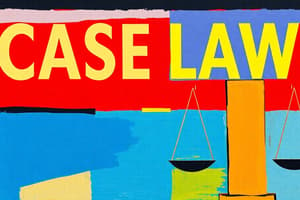Podcast
Questions and Answers
What type of cases does the General Regulatory Chamber handle?
What type of cases does the General Regulatory Chamber handle?
- Food safety (correct)
- Social security and child support
- Criminal injuries compensation
- Asylum support
Which of the following areas is NOT a specialization of the Social Entitlement Chamber?
Which of the following areas is NOT a specialization of the Social Entitlement Chamber?
- Asylum support
- Social security and child support
- Criminal injuries compensation
- Welfare of animals (correct)
Which chamber is responsible for cases involving charities?
Which chamber is responsible for cases involving charities?
- Social Entitlement Chamber
- General Regulatory Chamber (correct)
- Immigration services
- Environment
What type of disputes does the Environmental specialization of the General Regulatory Chamber address?
What type of disputes does the Environmental specialization of the General Regulatory Chamber address?
Which options represent specializations of the General Regulatory Chamber? (Select all that apply)
Which options represent specializations of the General Regulatory Chamber? (Select all that apply)
What is the principle behind 'Equity follows the law'?
What is the principle behind 'Equity follows the law'?
Under which circumstance will equity provide a remedy according to common law principles?
Under which circumstance will equity provide a remedy according to common law principles?
Which statement is true regarding the role of equity in relation to volunteers?
Which statement is true regarding the role of equity in relation to volunteers?
What is meant by 'Equality is equity' in equitable rights?
What is meant by 'Equality is equity' in equitable rights?
What does the term 'equity of redemption' refer to?
What does the term 'equity of redemption' refer to?
Which of the following is NOT a common equitable remedy?
Which of the following is NOT a common equitable remedy?
How did the law of trusts originate in relation to equity?
How did the law of trusts originate in relation to equity?
What is a key characteristic of equitable remedies?
What is a key characteristic of equitable remedies?
What is the primary function of appellate courts?
What is the primary function of appellate courts?
When was the Supreme Court of the United Kingdom created?
When was the Supreme Court of the United Kingdom created?
What is the maximum number of judges that usually sit on a case in the Court of Appeal?
What is the maximum number of judges that usually sit on a case in the Court of Appeal?
Which type of cases does the Supreme Court not hear?
Which type of cases does the Supreme Court not hear?
What is the location of the Supreme Court of the United Kingdom?
What is the location of the Supreme Court of the United Kingdom?
The Court of Appeal consists of different divisions. Which division deals specifically with criminal appeals?
The Court of Appeal consists of different divisions. Which division deals specifically with criminal appeals?
How many judges are styled 'Justices of the Supreme Court'?
How many judges are styled 'Justices of the Supreme Court'?
What type of evidence does the Supreme Court consider during its proceedings?
What type of evidence does the Supreme Court consider during its proceedings?
What is the primary purpose of a mandatory injunction?
What is the primary purpose of a mandatory injunction?
Under what circumstance is specific performance typically granted?
Under what circumstance is specific performance typically granted?
Which of the following is true regarding rescission?
Which of the following is true regarding rescission?
What must be proven for a local custom to be recognized as a legal right?
What must be proven for a local custom to be recognized as a legal right?
Which statement accurately describes interim injunctions?
Which statement accurately describes interim injunctions?
What is a prohibitory injunction designed to do?
What is a prohibitory injunction designed to do?
Which of the following best describes the characteristics of valid local customs?
Which of the following best describes the characteristics of valid local customs?
What is the significance of the year 1189 in relation to local customs?
What is the significance of the year 1189 in relation to local customs?
What was the primary aim of the Council of Europe when it was formed?
What was the primary aim of the Council of Europe when it was formed?
When did the European Court of Human Rights officially come into existence?
When did the European Court of Human Rights officially come into existence?
What role did the European Commission of Human Rights play before its abolition in 1998?
What role did the European Commission of Human Rights play before its abolition in 1998?
What significant legal change occurred with the Human Rights Act 1998?
What significant legal change occurred with the Human Rights Act 1998?
What does Section 2 of the Human Rights Act 1998 require from UK courts?
What does Section 2 of the Human Rights Act 1998 require from UK courts?
In what year did the individual right to petition the European Court of Human Rights become available to UK citizens?
In what year did the individual right to petition the European Court of Human Rights become available to UK citizens?
What major change occurred with the European Commission and Court in 1998?
What major change occurred with the European Commission and Court in 1998?
Where is the European Court of Human Rights based?
Where is the European Court of Human Rights based?
What is the relationship between common law and equity?
What is the relationship between common law and equity?
What does 'common law' traditionally refer to?
What does 'common law' traditionally refer to?
How is case law significant in the legal system of England and Wales?
How is case law significant in the legal system of England and Wales?
Which statement best describes equity?
Which statement best describes equity?
What does 'equity' represent in the context of English law?
What does 'equity' represent in the context of English law?
What is the implication of having judicial precedence in case law?
What is the implication of having judicial precedence in case law?
Why is case law considered a major source of domestic law?
Why is case law considered a major source of domestic law?
What distinguishes common law from equity?
What distinguishes common law from equity?
Flashcards
Equity follows the law
Equity follows the law
Equity will not create a remedy that goes against existing law.
Where there is equal equity, the law will prevail
Where there is equal equity, the law will prevail
When two parties are equally deserving, the law will decide the outcome.
Equity will not assist a volunteer
Equity will not assist a volunteer
Equity won't help someone who hasn't given something in return for a promise.
Equity will not allow a statute to be used as an instrument of fraud
Equity will not allow a statute to be used as an instrument of fraud
Signup and view all the flashcards
Equality is equity
Equality is equity
Signup and view all the flashcards
Equity of redemption
Equity of redemption
Signup and view all the flashcards
Equitable rights
Equitable rights
Signup and view all the flashcards
Equitable remedies
Equitable remedies
Signup and view all the flashcards
Common Law
Common Law
Signup and view all the flashcards
Equity
Equity
Signup and view all the flashcards
Case Law
Case Law
Signup and view all the flashcards
Judicial Precedent
Judicial Precedent
Signup and view all the flashcards
Fusion of Common Law and Equity
Fusion of Common Law and Equity
Signup and view all the flashcards
Non-legislative Law
Non-legislative Law
Signup and view all the flashcards
Equity as a Source of Law
Equity as a Source of Law
Signup and view all the flashcards
Contrast between Common Law and Equity
Contrast between Common Law and Equity
Signup and view all the flashcards
Injunction
Injunction
Signup and view all the flashcards
Mandatory Injunction
Mandatory Injunction
Signup and view all the flashcards
Prohibitory Injunction
Prohibitory Injunction
Signup and view all the flashcards
Interim Injunction
Interim Injunction
Signup and view all the flashcards
Specific Performance
Specific Performance
Signup and view all the flashcards
Rescission
Rescission
Signup and view all the flashcards
Local Custom
Local Custom
Signup and view all the flashcards
Tests for Local Customs
Tests for Local Customs
Signup and view all the flashcards
First-tier Tribunal
First-tier Tribunal
Signup and view all the flashcards
General Regulatory Chamber
General Regulatory Chamber
Signup and view all the flashcards
Social Entitlement Chamber
Social Entitlement Chamber
Signup and view all the flashcards
Asylum support, Criminal injuries compensation
Asylum support, Criminal injuries compensation
Signup and view all the flashcards
Social security and child support
Social security and child support
Signup and view all the flashcards
What is the Supreme Court of the UK?
What is the Supreme Court of the UK?
Signup and view all the flashcards
What is an appellate court?
What is an appellate court?
Signup and view all the flashcards
What is a trial court?
What is a trial court?
Signup and view all the flashcards
What is a combined court?
What is a combined court?
Signup and view all the flashcards
Describe the structure of the Court of Appeal.
Describe the structure of the Court of Appeal.
Signup and view all the flashcards
What does the Court of Appeal focus on?
What does the Court of Appeal focus on?
Signup and view all the flashcards
How many judges are typically present in Court of Appeal cases?
How many judges are typically present in Court of Appeal cases?
Signup and view all the flashcards
What is the role of the Court of Appeal (Criminal Division)?
What is the role of the Court of Appeal (Criminal Division)?
Signup and view all the flashcards
ECHR origin
ECHR origin
Signup and view all the flashcards
European Court of Human Rights purpose
European Court of Human Rights purpose
Signup and view all the flashcards
European Commission of Human Rights function
European Commission of Human Rights function
Signup and view all the flashcards
Human Rights Act 1998 effect
Human Rights Act 1998 effect
Signup and view all the flashcards
Human Rights Act 1998 and precedent
Human Rights Act 1998 and precedent
Signup and view all the flashcards
Human Rights Act 1998 and case law
Human Rights Act 1998 and case law
Signup and view all the flashcards
Human Rights Act 1998 and overruling
Human Rights Act 1998 and overruling
Signup and view all the flashcards
Human Rights Act and judicial precedent
Human Rights Act and judicial precedent
Signup and view all the flashcards
Study Notes
Case Law
- Case law is a source of law broken down into common law, equity, and custom.
- Common law and equity have a history that developed over time.
- This chapter provides an overview of custom as another source of law.
- The chapter also reviews the court structure and hierarchy in the UK legal system.
- The chapter concludes with a discussion on the European Court of Human Rights and the Human Rights Act of 1998.
Common Law and Equity
- The common law consists of judge-made rulings and decisions from various courts.
- Common law courts include the Court of Common Pleas, Exchequer, and King's Bench.
- Initially, there wasn't a single system of law throughout the whole country. Local customs varied.
- The Norman Conquest brought about a more unified legal system.
- Cases were heard by 'Assizes' of the King's courts.
- Equity developed as a separate branch of law focused on notions of fairness.
- The Lord Chancellor, initially acting as the King's conscience, decided cases based on fairness and natural justice.
- This led to the emergence of the Court of Chancery.
- Cases decided by the common law and chancery courts sometimes conflicted.
- The Supreme Court of Judicature Acts of 1873 and 1875 eventually merged equity and common law administration.
The Emergence of Common Law
- Before 1066, there was no uniform legal system in the country.
- Local customs ruled at the local level.
- The Norman Conquest led to the emergence of a single legal system.
- Judges developed rules and principles by consistently applying local customs.
- The common law was formed from a combination of custom and case law.
Problems with Common Law
- Actions could only be brought if there was already a corresponding writ.
- The procedure was inflexible and costly, leading to delay.
- Monetary compensation was not often an adequate remedy.
- Common law did not recognize specific rights like trusts or mortgages.
Equity
- Equity is an alternative legal system based on fairness.
- The Court of Chancery was established to resolve cases the common law could not address.
- The Court of Chancery decisions were based on fairness and natural justice.
- Equity developed its own maxims, rights, and remedies (e.g., injunctions, specific performance).
- It also created new rights not covered in common law (e.g., equitable remedies).
- The conflict between common law and equity produced different outcomes.
- The Supreme Court of Judicature Acts of 1873 and 1875 ultimately integrated common law and equity principles.
Custom
- Custom is a source of law based on established practices.
- To be valid, a custom must meet stringent requirements (e.g., immemorial existence, continuity, reasonableness).
- Customs are usually relevant in the context of land disputes.
Courts, Personnel, and Jurisdictions
- The UK court system consists of various levels (e.g. Trial, Appellate).
- Courts like King's Bench, Exchequer, and Common pleas were important in the development of common law.
- Specialized courts such as the Administrative, Admiralty, and Technology and Construction Courts exist.
Supreme Court
- The Supreme Court became the final court of appeal in the UK in 2009.
- It consists of twelve judges.
Court of Appeal
- The Court of Appeal hears appeals from lower courts.
- It deals with both criminal and civil matters.
High Court
- The High Court is divided into three divisions: King's Bench, Chancery, and Family.
- It handles a vast array of legal issues in civil matters.
County Court
- The County Court deals with less complex civil cases.
- It has jurisdictional limits.
- It includes small claims, personal injury, and other types of civil cases where the value of the claim is lower.
Tribunals
- Tribunals offer an alternative dispute resolution mechanism.
- There are various types of tribunals for different specific areas (e.g. Tax, Immigration & Asylum).
- Tribunals offer a more accessible and quicker process, often with less formal procedures.
The European Court of Human Rights (ECtHR)
- The ECtHR is a crucial international court.
- The European Convention on Human rights (ECHR) provides the legal framework for the ECtHR and determines standards of behavior.
- The Human Rights Act of 1998 introduced the ECHR into UK law.
Studying That Suits You
Use AI to generate personalized quizzes and flashcards to suit your learning preferences.




